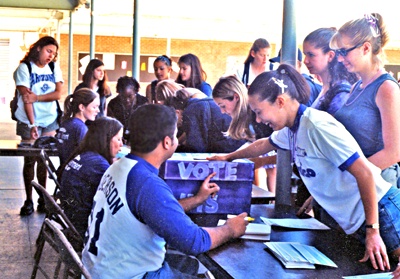All Nonfiction
- Bullying
- Books
- Academic
- Author Interviews
- Celebrity interviews
- College Articles
- College Essays
- Educator of the Year
- Heroes
- Interviews
- Memoir
- Personal Experience
- Sports
- Travel & Culture
All Opinions
- Bullying
- Current Events / Politics
- Discrimination
- Drugs / Alcohol / Smoking
- Entertainment / Celebrities
- Environment
- Love / Relationships
- Movies / Music / TV
- Pop Culture / Trends
- School / College
- Social Issues / Civics
- Spirituality / Religion
- Sports / Hobbies
All Hot Topics
- Bullying
- Community Service
- Environment
- Health
- Letters to the Editor
- Pride & Prejudice
- What Matters
- Back
Summer Guide
- Program Links
- Program Reviews
- Back
College Guide
- College Links
- College Reviews
- College Essays
- College Articles
- Back
The Voting Age: Responsibility or the Pacification of Teens?
Teenagers are currently being subjected to the problems of the “adult” world, but are still criticized as “childish and too young” when they speak up. As of now, the legal voting age is set at 18 years old - an arbitrary and outdated limit that dates back to a time where issues such as gun control and climate change weren't so prolific. Deciding the administration who is in charge of our nation should include a wider range of ideas, personalities, and concerns, which can only be made possible by lowering the voting age to 16.
The young people who have come forward to call for gun control in the wake of the mass shooting at Marjory Stoneman Douglas High School are challenging the stereotype of American kids as indolent, smartphone-addicted zombies. Events such as mass shootings have directly impacted these students’ lives, and are frequently being overlooked by interest groups and the government. Many of these student activists cannot even vote, but have inspired entire movements and concrete reform both at the state level and the federal level. For these 16 and 17-year-olds, the right to vote is a logical proposal.
Arguments about the legality regarding teenagers becoming adults at 18 are ludicrous. What do 18 years even signify in the U.S.? It is not a set age where an individual becomes all-knowing of the political process, and it is certainly not a measure of intellectual capacity.
The New York Times explains, “When considering the intellectual capacity of teenagers, it is important to distinguish between what psychologists call “cold” and “hot” cognition. Cold cognitive abilities are those we use when we are in a calm situation, when we are by ourselves and have time to deliberate and when the most important skill is the ability to reason logically with facts. Voting is a good example of this sort of situation. Studies of cold cognition have shown that the skills necessary to make informed decisions are firmly in place by 16 … Teenagers may sometimes make bad choices, but statistically speaking, they do not make them any more often than adults do.”
Voter turnout for 16 and 17-year-olds is also higher than the 18 to 24-year-old range. In other countries with more lenient voting laws, like Argentina, Austria, Brazil and Nicaragua, voter turnout among 16- and 17-year-olds is significantly higher than it is among older young adults. This is also true in parts of the United States as well; in Takoma Park, Maryland, a city that permits 16- and 17-year-olds to vote in local elections, that age group is twice as likely to vote than are 18-year-olds.
With the changing political climate, growing issues that greatly affect younger citizens have proliferated across the country. The distinction between 18 years and 16 years is arbitrary and has been disproven. In short, America would benefit from a new group of voters that boost turnout and represent a silent majority.

Similar Articles
JOIN THE DISCUSSION
This article has 0 comments.
